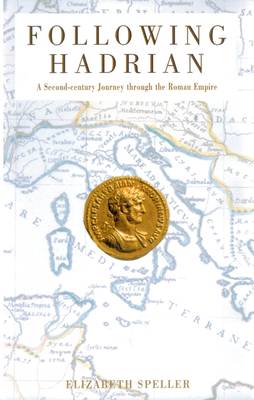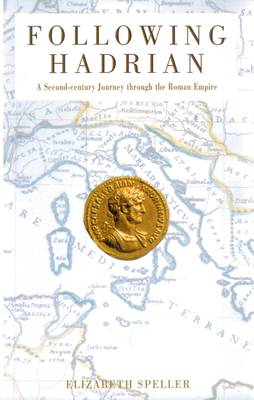
En raison d'une grêve chez bpost, votre commande pourrait être retardée. Vous avez besoin d’un livre rapidement ? Nos magasins vous accueillent à bras ouverts !
- Retrait gratuit dans votre magasin Club
- 7.000.000 titres dans notre catalogue
- Payer en toute sécurité
- Toujours un magasin près de chez vous
En raison de la grêve chez bpost, votre commande pourrait être retardée. Vous avez besoin d’un livre rapidement ? Nos magasins vous accueillent à bras ouverts !
- Retrait gratuit dans votre magasin Club
- 7.000.0000 titres dans notre catalogue
- Payer en toute sécurité
- Toujours un magasin près de chez vous
Following Hadrian
A Second-Century Journey Through the Roman Empire
Elizabeth Speller
Livre broché | Anglais
38,95 €
+ 77 points
Format
Description
One of the greatest--and most enigmatic--Roman emperors, Hadrian stabilized the imperial borders, established peace throughout the empire, patronized the arts, and built an architectural legacy that lasts to this day: the great villa at Tivoli, the domed wonder of the Pantheon, and the eponymous wall that stretches across Britain. Yet the story of his reign is also a tale of intrigue, domestic discord, and murder.
In Following Hadrian, Elizabeth Speller captures the fascinating life of Hadrian, ruler of the most powerful empire on earth at the peak of its glory. Speller displays a superb gift for narrative as she traces the intrigue of Hadrian's rise: his calculated marriage to Emperor Trajan's closest female relative, a woman he privately tormented; Trajan's suspicious deathbed adoption of Hadrian as his heir, a stroke some thought to be a post-mortem forgery; and the ensuing slaughter of potential rivals by an ally of Hadrian's. Speller makes brilliant use of her sources, vividly depicting Hadrian's bouts of melancholy, his intellectual passions, his love for a beautiful boy (whose death sent him into a spiral), and the paradox of his general policies of peace and religious tolerance even as he conducted a bitter, three-year war with Judea.
Most important, the author captures the emperor as both a builder and an inveterate traveler, guiding readers on a grand tour of the Roman Empire at the moment of its greatest extent and accomplishment, from the barren, windswept frontiers of Britain to the teeming streets of Antioch, from the dangers of the German forest to the urban splendor of Rome itself.
In Following Hadrian, Elizabeth Speller captures the fascinating life of Hadrian, ruler of the most powerful empire on earth at the peak of its glory. Speller displays a superb gift for narrative as she traces the intrigue of Hadrian's rise: his calculated marriage to Emperor Trajan's closest female relative, a woman he privately tormented; Trajan's suspicious deathbed adoption of Hadrian as his heir, a stroke some thought to be a post-mortem forgery; and the ensuing slaughter of potential rivals by an ally of Hadrian's. Speller makes brilliant use of her sources, vividly depicting Hadrian's bouts of melancholy, his intellectual passions, his love for a beautiful boy (whose death sent him into a spiral), and the paradox of his general policies of peace and religious tolerance even as he conducted a bitter, three-year war with Judea.
Most important, the author captures the emperor as both a builder and an inveterate traveler, guiding readers on a grand tour of the Roman Empire at the moment of its greatest extent and accomplishment, from the barren, windswept frontiers of Britain to the teeming streets of Antioch, from the dangers of the German forest to the urban splendor of Rome itself.
Spécifications
Parties prenantes
- Auteur(s) :
- Editeur:
Contenu
- Nombre de pages :
- 361
- Langue:
- Anglais
Caractéristiques
- EAN:
- 9780195176131
- Date de parution :
- 14-10-04
- Format:
- Livre broché
- Format numérique:
- Trade paperback (VS)
- Dimensions :
- 141 mm x 217 mm
- Poids :
- 453 g

Les avis
Nous publions uniquement les avis qui respectent les conditions requises. Consultez nos conditions pour les avis.






